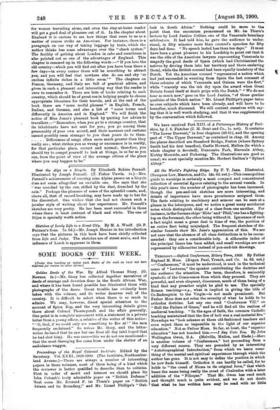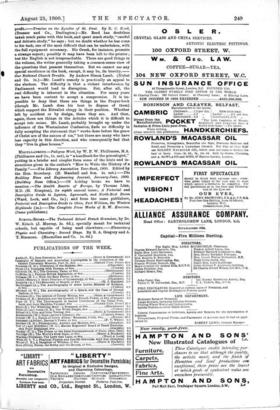THEOLOGY. — Oxford Conferences, Hilary Term, 1900. By Father Raphael M. Moss.
(Began Paul, Trench, and Co. ls. 6d. net.) —" Conferences," it must be understood, is used in the technical sense of " Lectures," the speaker contributing the doctrine and the audience the attention. The term, therefore, is eminently symbolic of the Communion from which they proceed. They are powerful, and even eloquent, discourses, much of them being of a kind that any preacher might be glad to use. The specially Roman teaching—e.g., what is implied in giving the title of Co-Redemptrix to the Virgin—is not made prominent. But Father Moss does not relax the severity of what he holds to be orthodox doctrine. Let any one read " Conference VII." on " Hell the Failure of Grace," and he will find all the realism of mediaeval teaching. " In the ages of faith, the common Catholic teaching maintained that the fire of hell was a real material fire." Nowadays we "look askance at these old-fashioned teachers and even reject them as impossible in the light of our superior education." Not so Father Moss. So far, at least, the "superior education" has not touched him.—I Say Unto You. By John Wellington Owen, B.A. (Melville, Mullen, and Slade.)—Here is another volume of "Conferences," but proceeding from a very different source. They are preceded by an interesting " Autobiographical Introduction," from which we learn some- thing of the mental and spiritual experiences through which the author has gone. It is not easy to define the position in which he now finds himself. Orthodox it can hardly be called, for he holds to " the creed of Rican' in its original form," that which bears the name being really the creed of Chalcedon with a later addition of the " Pilioque." That Mr. Owen has read much and thought much is quite evident, and we do not doubt that what he has written here may be read with no little profit.—Treatise on the Epistles of St. Paul. By R. C. Reed, (Dresser and Co., Darlington.)—Mr. Reed has doubtless takeii much pains with this book, and spent much study, "careful and delicate study." he says ; but we doubt whether he has come to his task, one of the most difficult that can be undertaken, with the full equipment necessary. His Greek, for instance, presents a strange aspect ; possibly it may have been left to the printer ; but the English is not irreproachable. There are good things in the volume, the writer generally taking a common-sense view of the questions that present themselves. But we cannot see any special excellence in the book, except, it may be, its brevity.— Our National Church .Trouble. By Andrew Simon Lamb. (Nisbet and Co. ls.)—Mr. Lamb's remedy is practically an appeal to the electors. The difficulty is that a violent interference by Parliament would lead to disruption. But, after all, the real -difficulty is inherent in the situation. For many years we have been content to accept a compromise. It is im- possible to deny that there are things in the Prayer-book (though Mr. Lamb does his best to dispose of them) which support the Ritualist clergy in their position. Whether left by accident or by design, there they are. And then, again, there are things in the Articles which it is difficult to accept toto animo. Mr. Lamb, probably brought up under the influence of the Westminster Confession, finds no difficulty in fully accepting the statement that " works done before the grace of Christ are of the nature of sin," but there are many who have less capacity in this direction, and who consequently feel that they "live in glass houses."



































 Previous page
Previous page